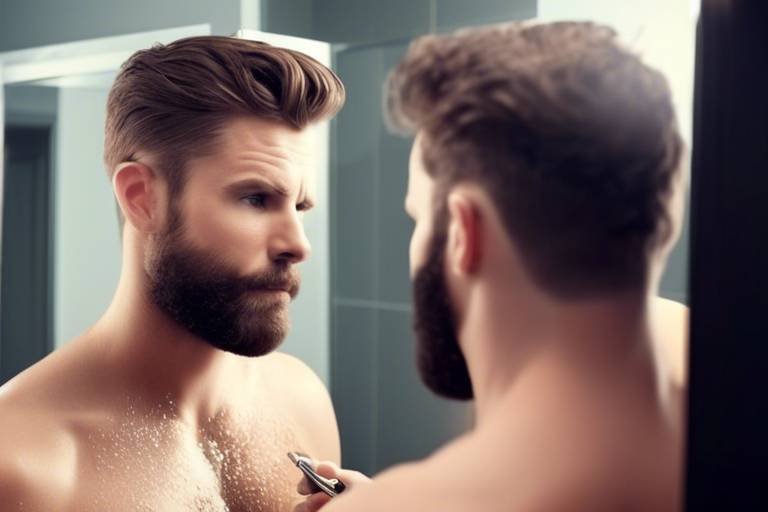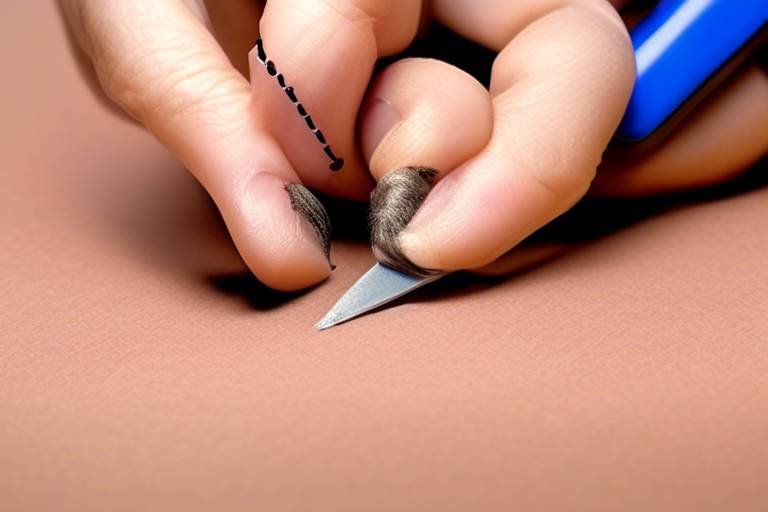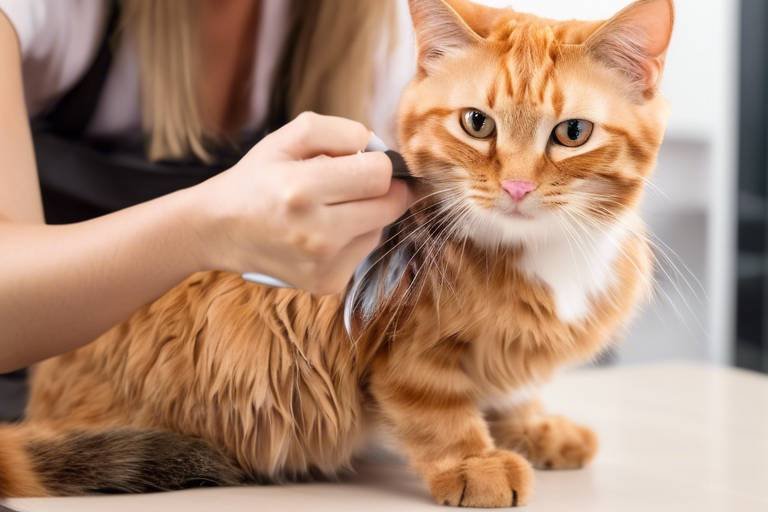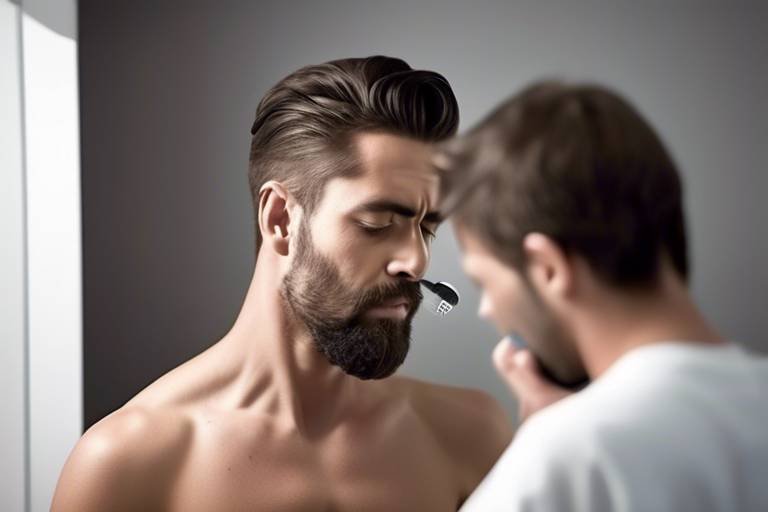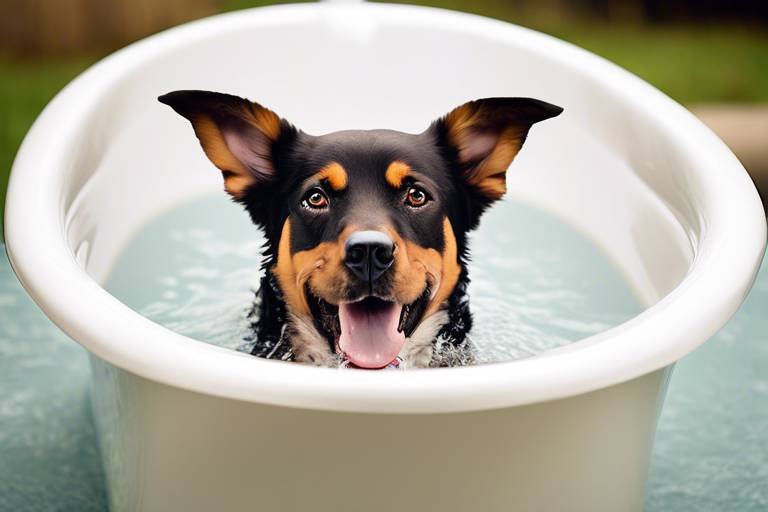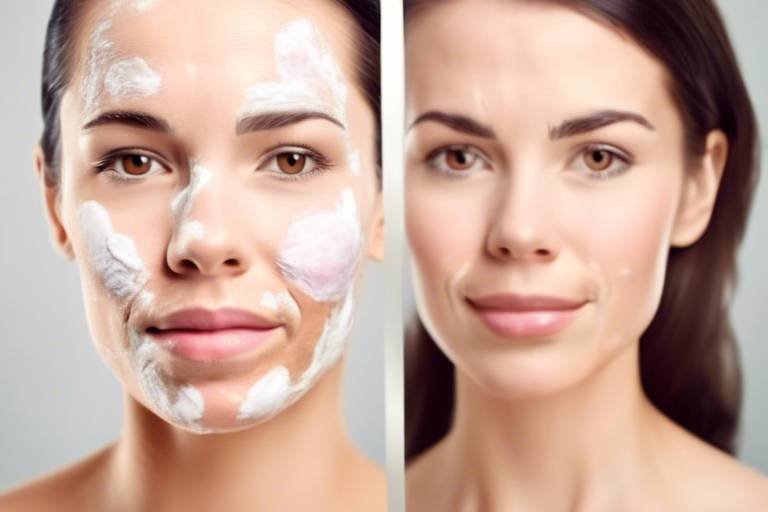Grooming Products You Should Avoid
In today's world, where personal grooming is often equated with self-care, it’s essential to be aware of the products we use on our bodies. While many grooming products promise to enhance our appearance and boost our confidence, not all of them are created equal. Some may contain harmful ingredients that can do more harm than good. This article dives into the various grooming products you should steer clear of, focusing on their potential negative effects and offering healthier alternatives. By making informed choices, you can ensure that your grooming routine is not only effective but also safe for your skin and overall health.
Many grooming products are packed with harsh chemicals that can irritate the skin, leading to long-term damage. These ingredients, often included to enhance product performance or shelf life, can wreak havoc on your skin's natural balance. For example, sulfates, commonly found in shampoos and body washes, can strip away natural oils, leaving your skin and hair dry and vulnerable. To avoid potential health risks, it’s crucial to read labels and understand what you’re putting on your body. Opt for products with natural ingredients that nourish rather than harm. Your skin deserves better!
Have you ever noticed how some products smell so good that you can't resist? But beware! Products laden with synthetic fragrances can lead to allergic reactions and skin sensitivities. These fragrances, often derived from a cocktail of chemicals, can trigger everything from mild irritation to severe allergic responses. It's not just about the pleasant scent; it's about your health! Recognizing the impact of these fragrances on your skin can help you make better choices. Instead of fragrance-heavy products, consider those that use natural scents derived from essential oils, which can provide a delightful aroma without the harmful effects.
Many grooming products contain allergens that can provoke skin reactions. Identifying these allergens is the first step toward choosing safer alternatives. Common offenders include:
- Fragrance compounds
- Preservatives like parabens
- Coloring agents
By being aware of these ingredients, you can avoid products that may trigger your allergies and instead choose formulations that prioritize your skin's health.
Parabens are widely used preservatives that may disrupt hormone function. These chemicals can mimic estrogen in the body, potentially leading to hormonal imbalances. This is particularly concerning for anyone who is pregnant or has a history of hormone-related issues. Avoiding products with parabens can be crucial for maintaining hormonal balance and overall health. Look for paraben-free labels to ensure your grooming routine is safe.
Phthalates are chemicals often found in fragrances that can have adverse effects on reproductive health. They are used to make fragrances last longer but can be harmful when absorbed through the skin. Steering clear of these substances is essential for long-term well-being. Always check labels and opt for products that are phthalate-free to protect your health.
Exploring natural alternatives to chemical-laden grooming products can lead to healthier choices. Many effective options are available that prioritize skin health without harmful ingredients. For instance, consider using coconut oil as a moisturizer instead of synthetic creams filled with chemicals. Not only is it effective, but it also nourishes your skin naturally. Embrace the power of nature in your grooming routine!
Excessive exfoliation can damage the skin barrier, leading to irritation and sensitivity. It’s a common misconception that more exfoliation equals better skin. In reality, understanding the importance of balance in exfoliation can help maintain healthy skin. Over-exfoliating strips away essential oils and can leave your skin vulnerable to environmental stressors.
Differentiating between physical and chemical exfoliants is vital. Physical exfoliants use granules to scrub away dead skin, while chemical exfoliants use acids to dissolve dead skin cells. Knowing which types are suitable for your skin type can prevent over-exfoliation and promote skin health. For sensitive skin, consider opting for gentle chemical exfoliants that provide a smoother experience without the harsh scrubbing.
Determining the right frequency for exfoliation is crucial. Overuse can lead to redness and irritation, while proper use can enhance skin texture and appearance. A good rule of thumb is to exfoliate no more than 1-2 times a week, depending on your skin type. Listen to your skin; it often knows best!
Alcohol can be extremely drying and irritating to the skin. Many grooming products, like toners and astringents, contain high levels of alcohol, which can strip moisture and lead to a compromised skin barrier. Evaluating the presence of alcohol in grooming products can help you avoid unnecessary skin damage. Instead, look for alcohol-free options that cleanse without the drying effects.
Understanding the different types of alcohols used in grooming products is essential. Some are drying, while others can be beneficial for the skin. For instance, denatured alcohol is often used in products for its quick-drying properties but can be harsh on the skin. In contrast, fatty alcohols like cetyl and stearyl alcohol can provide moisturizing benefits. Always check the ingredient list to ensure you're choosing the right type for your skin.
Choosing moisturizing alternatives to alcohol-based products can provide hydration without irritation. Ingredients like glycerin, aloe vera, and hyaluronic acid can effectively hydrate your skin without the drawbacks of alcohol. This ensures healthier skin without compromising on effectiveness. Remember, your skin deserves the best!
Q1: How can I identify harmful ingredients in grooming products?
A1: Always read the ingredient list on the product label. Look for known harmful ingredients such as parabens, phthalates, and synthetic fragrances.
Q2: Are natural products always better than synthetic ones?
A2: Not necessarily. While many natural products are beneficial, it's essential to ensure they are suitable for your skin type and free from allergens.
Q3: How often should I exfoliate my skin?
A3: Generally, 1-2 times a week is recommended, but it varies based on your skin type. Listen to your skin and adjust accordingly.
Q4: What are some safe alternatives to alcohol-based products?
A4: Look for products that contain hydrating ingredients like glycerin, aloe vera, or hyaluronic acid instead of alcohol.

Harsh Chemical Ingredients
When it comes to grooming products, are often lurking in the background, ready to wreak havoc on your skin. These ingredients, while they may promise instant results, can lead to long-term damage that you might not notice until it's too late. Imagine using a product that feels great initially, only to discover it has left your skin irritated and sensitive. Sounds frustrating, right? That's the reality for many who overlook the fine print on their favorite grooming products.
One of the most concerning aspects of these harsh chemicals is their potential to disrupt the skin's natural barrier. Your skin is like a fortress, designed to protect you from external aggressors. When you introduce aggressive chemicals, it's like leaving the gates wide open, allowing irritants and allergens to invade. Common offenders include sulfates, which are often included in shampoos and cleansers for their lathering properties. While they may make your hair feel squeaky clean, they can strip away natural oils, leading to dryness and irritation.
Another ingredient to watch out for is formaldehyde, a known irritant that can cause allergic reactions and even long-term health issues. It's often found in hair straightening treatments and some nail polishes. The irony is that these products are marketed to enhance your beauty, yet they can be doing the exact opposite. To help you navigate this minefield of ingredients, here's a quick table summarizing some common harsh chemicals you might find in grooming products:
| Chemical | Common Uses | Potential Effects |
|---|---|---|
| Sulfates | Shampoos, cleansers | Dryness, irritation |
| Formaldehyde | Hair treatments, nail products | Allergic reactions, health risks |
| Parabens | Preservatives in lotions, creams | Hormonal disruption |
| Phthalates | Fragrances, hair products | Reproductive health issues |
By understanding what these ingredients are and how they impact your skin, you can make more informed choices. It’s not just about picking the most popular product; it’s about choosing one that aligns with your health goals. So, next time you’re shopping for grooming products, take a moment to read the labels. Your skin will thank you for it!

Fragrance-Heavy Formulations
When it comes to grooming products, one of the biggest culprits for skin irritation and allergic reactions are those . You might be enticed by the alluring scents wafting from the shelves, but have you ever stopped to consider what those fragrances are doing to your skin? Many products boast a delightful aroma, yet they often contain synthetic fragrances that can wreak havoc on your skin's delicate balance. Imagine slathering on a lotion that smells like a summer garden, only to find your skin red and inflamed a few hours later. It’s a classic case of beauty being skin deep, and unfortunately, most people don’t realize the potential harm until it’s too late.
These synthetic fragrances can trigger a range of reactions, from mild irritation to severe allergic responses. The truth is, there’s a cocktail of chemicals hidden behind that delightful scent, and many of them are known to be common allergens. For instance, ingredients like linalool and limonene are frequently found in scented products and can cause skin sensitivities in some individuals. It’s like a game of Russian roulette for your skin—one day you feel fabulous, and the next, you’re dealing with redness and discomfort. Isn’t it time we put our skin health first?
To illustrate the potential risks, let’s take a look at a
| Synthetic Fragrance | Potential Effects | Natural Alternative |
|---|---|---|
| Phthalates | Hormonal disruption, skin irritation | Essential oils (e.g., lavender, eucalyptus) |
| Parabens | Allergic reactions, skin sensitivities | Plant-based extracts (e.g., chamomile, aloe vera) |
| Fragrance Mixes | Headaches, respiratory issues | Natural fragrances (e.g., vanilla, citrus) |
So, what can you do to protect your skin while still enjoying pleasant scents? First and foremost, always read the labels. Look for products that are fragrance-free or use natural fragrances derived from essential oils. These alternatives not only provide a delightful aroma but also come with skin-soothing properties. For example, lavender oil is not just fragrant; it’s also known for its calming and anti-inflammatory benefits. By opting for products with natural ingredients, you’re not only being kind to your skin but also to your overall health.
In summary, while fragrance-heavy formulations may be tempting, they often come with hidden dangers that can harm your skin. By being informed and making conscious choices, you can steer clear of these potential pitfalls and embrace a more natural, skin-friendly grooming routine. Remember, your skin deserves the best, and sometimes that means skipping the synthetic scents in favor of something more wholesome.
- What are the signs of a fragrance allergy? Look out for redness, itching, or swelling after using a product.
- Are natural fragrances safer? Generally, yes, as they are derived from plants and have fewer irritants.
- How can I find fragrance-free products? Check the product labels for "fragrance-free" or "unscented."
Common Allergens
This article explores various grooming products that may be harmful or ineffective. We will discuss their potential negative effects and offer alternatives to help you make informed choices for your personal care routine.
Many grooming products contain harsh chemicals that can irritate the skin and cause long-term damage. Understanding these ingredients can help you avoid potential health risks associated with their use.
Products laden with synthetic fragrances often lead to allergic reactions and skin sensitivities. It’s important to recognize the impact of these fragrances on your skin and overall health.
When it comes to grooming products, one of the most significant concerns is the presence of . These allergens can provoke a range of skin reactions, from mild irritation to severe allergic responses. It's crucial to be aware of what you're putting on your skin, as some ingredients that seem harmless can actually cause more harm than good.
For instance, many shampoos, conditioners, and lotions contain allergens that can lead to unexpected reactions. Here are a few common offenders:
- Fragrances: Synthetic fragrances can be particularly problematic, often hiding a cocktail of chemicals that can trigger allergies.
- Preservatives: Ingredients like formaldehyde and certain parabens can also cause sensitivities and are best avoided.
- Essential Oils: While natural, some essential oils can still cause allergic reactions in sensitive individuals.
Understanding these allergens is key to making safer choices for your grooming routine. Always check product labels for these ingredients, and consider performing a patch test before fully incorporating a new product into your regimen. This simple step can save you from discomfort and potential skin issues down the line.
Parabens are widely used preservatives that may disrupt hormone function. Avoiding products with parabens can be crucial for maintaining hormonal balance and overall health.
Phthalates are chemicals often found in fragrances that can have adverse effects on reproductive health. Steering clear of these substances is essential for long-term well-being.
Exploring natural alternatives to chemical-laden grooming products can lead to healthier choices. Many effective options are available that prioritize skin health without harmful ingredients.
Excessive exfoliation can damage the skin barrier, leading to irritation and sensitivity. Understanding the importance of balance in exfoliation can help maintain healthy skin.
Differentiating between physical and chemical exfoliants is vital. Knowing which types are suitable for your skin type can prevent over-exfoliation and promote skin health.
Determining the right frequency for exfoliation is crucial. Overuse can lead to redness and irritation, while proper use can enhance skin texture and appearance.
Alcohol can be extremely drying and irritating to the skin. Evaluating the presence of alcohol in grooming products can help you avoid unnecessary skin damage.
Understanding the different types of alcohols used in grooming products is essential. Some are drying, while others can be beneficial for the skin.
Choosing moisturizing alternatives to alcohol-based products can provide hydration without irritation. This ensures healthier skin without compromising on effectiveness.
Q: What should I look for in grooming products to avoid allergens?
A: Always read the ingredient list and look for common allergens such as synthetic fragrances, parabens, and certain preservatives. Opt for products labeled as hypoallergenic or fragrance-free when possible.
Q: Are natural products always better?
A: Not necessarily. While many natural products are gentler on the skin, it's essential to check for specific allergens, as some natural ingredients can also cause reactions.
Q: How can I test for allergies before using a new product?
A: Perform a patch test by applying a small amount of the product to a discreet area of skin and waiting 24-48 hours to see if any reaction occurs.
Parabens
Parabens are a group of synthetic compounds commonly used as preservatives in many grooming and personal care products. These ingredients are often added to extend the shelf life of products, preventing the growth of harmful bacteria and mold. However, the convenience of parabens comes at a potential cost to your health. Research has indicated that parabens can be absorbed through the skin and may disrupt hormone function, leading to concerns about their impact on reproductive health and overall hormonal balance. This is particularly alarming given that many grooming products are applied liberally and frequently, increasing exposure over time.
The potential effects of parabens on the body have led to a growing movement advocating for paraben-free products. Many consumers are now opting for alternatives that use natural preservatives instead. It’s essential to read labels carefully and be aware of the different types of parabens, which may include:
- Butylparaben
- Ethylparaben
- Methylparaben
- Propylparaben
These compounds are often hidden under the term "paraben" in ingredient lists, making it crucial to be vigilant when selecting products. The good news is that the market has responded to consumer demand for safer options, and numerous brands now offer paraben-free alternatives that maintain product integrity without the associated health risks. By choosing these products, you not only prioritize your health but also support companies that are committed to safer, more natural formulations.
In conclusion, while parabens may serve a functional purpose in preserving grooming products, the potential health risks associated with their use cannot be ignored. By opting for paraben-free products, you can take a proactive step towards better personal care and overall well-being.
Phthalates
Phthalates are a group of chemicals commonly used in a variety of grooming products, including perfumes, lotions, and hair sprays. These substances serve as plasticizers, making products more flexible and durable. However, their presence in personal care items raises significant health concerns, particularly regarding reproductive health. Studies have indicated that phthalates can disrupt endocrine functions, leading to hormonal imbalances that may affect both men and women. For instance, exposure to phthalates has been linked to reduced testosterone levels in males, which can impact fertility and overall health.
Moreover, phthalates can accumulate in the body over time, leading to potential long-term effects. This is especially worrying for pregnant women, as research suggests that phthalate exposure during pregnancy may be associated with developmental issues in children. Therefore, it’s crucial to scrutinize the ingredients list of grooming products and steer clear of those containing phthalates.
To help you make informed choices, here’s a quick overview of common products that often contain phthalates:
| Product Type | Common Phthalate Ingredients |
|---|---|
| Fragrances | DBP (Dibutyl Phthalate), DEP (Diethyl Phthalate) |
| Hair Products | DEHP (Di(2-ethylhexyl) Phthalate) |
| Moisturizers | BBP (Benzyl Butyl Phthalate) |
Instead of using products laden with phthalates, consider opting for natural alternatives. Many brands now offer phthalate-free options that use essential oils and natural extracts for fragrance and preservation. These alternatives not only protect your health but also provide effective results without the harmful side effects associated with synthetic chemicals.
In conclusion, being aware of the ingredients in your grooming products is essential for maintaining both your health and beauty. By avoiding phthalates and choosing safer, natural alternatives, you can ensure that your personal care routine is as effective as it is safe.
- What are phthalates? Phthalates are chemicals used to make products more flexible and durable, commonly found in personal care items.
- Why should I avoid phthalates? Phthalates can disrupt hormone function and have been linked to reproductive health issues.
- How can I identify products with phthalates? Always check the ingredient list for terms like DBP, DEP, DEHP, and BBP.
- Are there safe alternatives to phthalate-containing products? Yes, many brands offer phthalate-free products that use natural ingredients.
Natural Alternatives
This article explores various grooming products that may be harmful or ineffective. We will discuss their potential negative effects and offer alternatives to help you make informed choices for your personal care routine.
Many grooming products contain harsh chemicals that can irritate the skin and cause long-term damage. Understanding these ingredients can help you avoid potential health risks associated with their use.
Products laden with synthetic fragrances often lead to allergic reactions and skin sensitivities. It’s important to recognize the impact of these fragrances on your skin and overall health.
Certain grooming products contain allergens that can provoke skin reactions. Identifying these allergens can help you choose safer alternatives for your grooming needs.
Parabens are widely used preservatives that may disrupt hormone function. Avoiding products with parabens can be crucial for maintaining hormonal balance and overall health.
Phthalates are chemicals often found in fragrances that can have adverse effects on reproductive health. Steering clear of these substances is essential for long-term well-being.
Exploring natural alternatives to chemical-laden grooming products can lead to healthier choices. Many effective options are available that prioritize skin health without harmful ingredients. For instance, consider using products that contain natural oils like jojoba or argan oil. These oils are rich in vitamins and can provide deep hydration without the risk of irritation that often accompanies synthetic ingredients.
Another excellent alternative is aloe vera, known for its soothing properties. It can help calm irritated skin while providing moisture. When it comes to exfoliation, look for gentle scrubs made from natural ingredients like sugar or oatmeal rather than harsh microbeads or chemical exfoliants. These natural options can effectively remove dead skin cells without damaging the skin barrier.
Additionally, consider using herbal infusions in your grooming routine. Ingredients like chamomile and green tea are not only calming but also packed with antioxidants that can protect your skin from environmental stressors. You can easily find products that incorporate these natural elements or even create your own DIY solutions at home.
In summary, embracing natural alternatives not only benefits your skin but also contributes to a more sustainable approach to personal care. By choosing products with wholesome ingredients, you can enjoy the effectiveness of grooming products without the harmful side effects.
Excessive exfoliation can damage the skin barrier, leading to irritation and sensitivity. Understanding the importance of balance in exfoliation can help maintain healthy skin.
Differentiating between physical and chemical exfoliants is vital. Knowing which types are suitable for your skin type can prevent over-exfoliation and promote skin health.
Determining the right frequency for exfoliation is crucial. Overuse can lead to redness and irritation, while proper use can enhance skin texture and appearance.
Alcohol can be extremely drying and irritating to the skin. Evaluating the presence of alcohol in grooming products can help you avoid unnecessary skin damage.
Understanding the different types of alcohols used in grooming products is essential. Some are drying, while others can be beneficial for the skin.
Choosing moisturizing alternatives to alcohol-based products can provide hydration without irritation. This ensures healthier skin without compromising on effectiveness.
1. What are some natural ingredients to look for in grooming products?
Natural oils (like jojoba and argan), aloe vera, chamomile, and green tea are excellent choices.
2. How can I tell if a product contains harmful chemicals?
Always check the ingredient list for known irritants like parabens, phthalates, and synthetic fragrances.
3. Are natural products as effective as synthetic ones?
Yes, many natural products are just as effective, if not more so, without the harmful side effects.
4. How often should I exfoliate my skin?
It depends on your skin type, but generally 1-3 times a week is a good rule of thumb to avoid over-exfoliation.

Overly Exfoliating Products
This article explores various grooming products that may be harmful or ineffective. We will discuss their potential negative effects and offer alternatives to help you make informed choices for your personal care routine.
Many grooming products contain harsh chemicals that can irritate the skin and cause long-term damage. Understanding these ingredients can help you avoid potential health risks associated with their use.
Products laden with synthetic fragrances often lead to allergic reactions and skin sensitivities. It’s important to recognize the impact of these fragrances on your skin and overall health.
Certain grooming products contain allergens that can provoke skin reactions. Identifying these allergens can help you choose safer alternatives for your grooming needs.
Parabens are widely used preservatives that may disrupt hormone function. Avoiding products with parabens can be crucial for maintaining hormonal balance and overall health.
Phthalates are chemicals often found in fragrances that can have adverse effects on reproductive health. Steering clear of these substances is essential for long-term well-being.
Exploring natural alternatives to chemical-laden grooming products can lead to healthier choices. Many effective options are available that prioritize skin health without harmful ingredients.
Exfoliation is often hailed as the secret to glowing skin, but did you know that too much of a good thing can actually backfire? Overly exfoliating products can strip your skin of its natural barrier, leading to irritation, redness, and even increased sensitivity. Imagine your skin as a delicate fabric; when you scrub it too hard or too often, it can fray and lose its integrity. The key is to find a balance that allows your skin to breathe and regenerate without compromising its health.
There are two primary types of exfoliants: physical and chemical. Physical exfoliants include scrubs with granules or beads that manually remove dead skin cells, while chemical exfoliants use acids or enzymes to dissolve the bonds holding those cells together. While both methods can be beneficial, knowing which type suits your skin is crucial. For instance, if you have sensitive skin, a gentle chemical exfoliant may be more appropriate than a gritty scrub that can cause micro-tears.
When choosing between physical and chemical exfoliants, consider your skin type and concerns. Here’s a quick comparison:
| Type | Benefits | Drawbacks |
|---|---|---|
| Physical Exfoliants | Immediate smoothness and brightness | Can be abrasive; risk of micro-tears |
| Chemical Exfoliants | Gentle on skin; deeper penetration | May cause irritation if overused |
Finding the right frequency for exfoliation is equally important. While some might think that scrubbing daily will yield faster results, this can lead to a compromised skin barrier. Instead, consider starting with exfoliating once or twice a week, and adjust based on how your skin responds. Look for signs of irritation, such as redness or discomfort, and dial back if necessary. Remember, your skin is not a canvas to be scrubbed; it’s a living organ that deserves care and attention.
So, how do you determine the right frequency for exfoliation? It largely depends on your skin type. For example:
- Oily Skin: You might exfoliate 2-3 times a week, as your skin can handle it.
- Dry or Sensitive Skin: Stick to once a week to avoid excessive irritation.
- Combination Skin: A balanced approach is best; exfoliate once or twice a week, focusing on oily areas.
Ultimately, listening to your skin is key. If it feels tight or looks red, it might be time to ease up on the exfoliation.
Alcohol can be extremely drying and irritating to the skin. Evaluating the presence of alcohol in grooming products can help you avoid unnecessary skin damage.
Understanding the different types of alcohols used in grooming products is essential. Some are drying, while others can be beneficial for the skin.
Choosing moisturizing alternatives to alcohol-based products can provide hydration without irritation. This ensures healthier skin without compromising on effectiveness.
Q: How do I know if I’m over-exfoliating?
A: Look for signs of irritation, such as redness, tightness, or sensitivity. If you notice these, it might be time to reduce the frequency of exfoliation.
Q: Can I use both physical and chemical exfoliants?
A: Yes, but it’s essential to space them out and listen to your skin's needs. Using both on the same day can lead to irritation.
Q: What are some natural alternatives to exfoliants?
A: Natural options include oatmeal scrubs, sugar scrubs, or fruit enzymes like pineapple and papaya, which gently exfoliate without harsh chemicals.
Physical vs. Chemical Exfoliants
This article explores various grooming products that may be harmful or ineffective. We will discuss their potential negative effects and offer alternatives to help you make informed choices for your personal care routine.
Many grooming products contain harsh chemicals that can irritate the skin and cause long-term damage. Understanding these ingredients can help you avoid potential health risks associated with their use.
Products laden with synthetic fragrances often lead to allergic reactions and skin sensitivities. It’s important to recognize the impact of these fragrances on your skin and overall health.
Certain grooming products contain allergens that can provoke skin reactions. Identifying these allergens can help you choose safer alternatives for your grooming needs.
Parabens are widely used preservatives that may disrupt hormone function. Avoiding products with parabens can be crucial for maintaining hormonal balance and overall health.
Phthalates are chemicals often found in fragrances that can have adverse effects on reproductive health. Steering clear of these substances is essential for long-term well-being.
Exploring natural alternatives to chemical-laden grooming products can lead to healthier choices. Many effective options are available that prioritize skin health without harmful ingredients.
Excessive exfoliation can damage the skin barrier, leading to irritation and sensitivity. Understanding the importance of balance in exfoliation can help maintain healthy skin.
When it comes to exfoliation, there are two primary types: physical and chemical exfoliants. Each type has its unique benefits and drawbacks, and understanding the difference can significantly impact your skincare routine. Physical exfoliants, such as scrubs and brushes, work by manually sloughing off dead skin cells from the surface of your skin. They can provide immediate results, making your skin feel smooth and refreshed. However, using them too aggressively can lead to micro-tears in the skin, causing irritation and inflammation.
On the other hand, chemical exfoliants use acids or enzymes to dissolve dead skin cells and promote cell turnover. Common ingredients include alpha hydroxy acids (AHAs) like glycolic acid and beta hydroxy acids (BHAs) like salicylic acid. These exfoliants can penetrate deeper into the skin, providing a more thorough exfoliation without the risk of physical damage. However, they can be potent and may cause sensitivity if overused.
To help you understand the differences better, here’s a quick comparison:
| Type | How It Works | Benefits | Drawbacks |
|---|---|---|---|
| Physical Exfoliants | Manual scrubbing | Immediate smoothness | Risk of irritation |
| Chemical Exfoliants | Dissolves dead skin | Deeper penetration | Potential for sensitivity |
Ultimately, the choice between physical and chemical exfoliants comes down to your skin type and personal preference. If you have sensitive skin, you might want to lean towards chemical exfoliants that are gentler and less abrasive. However, if you enjoy the tactile experience of scrubbing, consider using physical exfoliants with fine particles and using them sparingly. Remember, moderation is key to achieving a glowing complexion without compromising your skin's health!
Alcohol can be extremely drying and irritating to the skin. Evaluating the presence of alcohol in grooming products can help you avoid unnecessary skin damage.
Understanding the different types of alcohols used in grooming products is essential. Some are drying, while others can be beneficial for the skin.
Choosing moisturizing alternatives to alcohol-based products can provide hydration without irritation. This ensures healthier skin without compromising on effectiveness.
- What are the signs that a grooming product may be harmful? Look for redness, irritation, or an allergic reaction after using a product, which may indicate harmful ingredients.
- How can I choose safer grooming products? Always read labels, research ingredients, and opt for products with natural or fewer synthetic components.
- Are natural products always better? Not necessarily. While many natural products are safer, it’s essential to check for allergens and irritants regardless of the source.
Frequency of Use
Determining the right frequency for exfoliation is crucial for maintaining healthy skin. Over-exfoliating can lead to a range of skin issues, including redness, irritation, and even breakouts. Think of your skin like a delicate fabric; too much friction can wear it down, while the right amount of care keeps it looking vibrant and fresh. So, how do you find that sweet spot?
Generally, it’s recommended to exfoliate 1 to 3 times a week, depending on your skin type. For instance, if you have oily or combination skin, you might find that 2 to 3 times a week works best for you. On the other hand, those with dry or sensitive skin should stick to once a week to avoid damaging the skin barrier. It's all about listening to your skin’s needs and adjusting accordingly.
To help you visualize this, here’s a simple table that outlines the recommended frequency based on different skin types:
| Skin Type | Recommended Frequency |
|---|---|
| Oily/Combination | 2-3 times a week |
| Dry/Sensitive | Once a week |
| Normal | 1-2 times a week |
Another important aspect to consider is the type of exfoliant you’re using. Physical exfoliants, like scrubs, may require more caution, as they can be harsher on the skin. On the flip side, chemical exfoliants, such as AHAs and BHAs, can often be used more frequently due to their gentler nature. However, even with chemical exfoliants, it’s vital to introduce them slowly into your routine. Start with once a week and gradually increase the frequency as your skin adjusts.
In summary, the key to effective exfoliation lies in moderation. Overdoing it can lead to more harm than good, while the right approach can enhance your skin's texture and appearance. Always pay attention to how your skin reacts and adjust your routine accordingly. After all, your skin is unique, and what works for someone else might not work for you!
- How do I know if I'm over-exfoliating? Look for signs like redness, irritation, or increased sensitivity. If you notice any of these, it may be time to cut back.
- Can I exfoliate every day? For most skin types, daily exfoliation is not recommended. Stick to the guidelines for your specific skin type.
- What should I do if my skin feels irritated after exfoliating? Stop using the exfoliant, give your skin a break, and consider consulting a dermatologist if irritation persists.

Alcohol-Based Products
This article explores various grooming products that may be harmful or ineffective. We will discuss their potential negative effects and offer alternatives to help you make informed choices for your personal care routine.
Many grooming products contain harsh chemicals that can irritate the skin and cause long-term damage. Understanding these ingredients can help you avoid potential health risks associated with their use.
Products laden with synthetic fragrances often lead to allergic reactions and skin sensitivities. It’s important to recognize the impact of these fragrances on your skin and overall health.
Certain grooming products contain allergens that can provoke skin reactions. Identifying these allergens can help you choose safer alternatives for your grooming needs.
Parabens are widely used preservatives that may disrupt hormone function. Avoiding products with parabens can be crucial for maintaining hormonal balance and overall health.
Phthalates are chemicals often found in fragrances that can have adverse effects on reproductive health. Steering clear of these substances is essential for long-term well-being.
Exploring natural alternatives to chemical-laden grooming products can lead to healthier choices. Many effective options are available that prioritize skin health without harmful ingredients.
Excessive exfoliation can damage the skin barrier, leading to irritation and sensitivity. Understanding the importance of balance in exfoliation can help maintain healthy skin.
Differentiating between physical and chemical exfoliants is vital. Knowing which types are suitable for your skin type can prevent over-exfoliation and promote skin health.
Determining the right frequency for exfoliation is crucial. Overuse can lead to redness and irritation, while proper use can enhance skin texture and appearance.
When it comes to grooming products, the presence of alcohol can raise a red flag for many. While alcohol can serve as a quick-drying agent, its effects on the skin can be quite detrimental. Imagine applying a product that feels refreshing at first but leaves your skin feeling parched and irritated shortly after. This is often the case with alcohol-based products. They can strip away the skin's natural oils, leading to dryness, flakiness, and even increased oil production as your skin tries to compensate for the loss of moisture.
Alcohol can be especially harsh for those with sensitive skin or conditions like eczema or rosacea. It’s not just about the immediate effects either; long-term use of alcohol-laden products can compromise your skin's barrier, making it more susceptible to environmental stressors and bacteria. To put it simply, using these products can feel like putting a band-aid on a wound that needs proper care. Instead of healing, you're likely to exacerbate the problem.
Not all alcohols are created equal. In grooming products, you’ll typically find two categories: drying alcohols and fatty alcohols. Drying alcohols, such as ethanol and isopropyl alcohol, are often included for their quick-drying properties but can be harsh on the skin. On the other hand, fatty alcohols like cetyl alcohol and stearyl alcohol are derived from natural fats and can actually help moisturize the skin. Understanding this difference is crucial when selecting products for your grooming routine.
| Type of Alcohol | Effects on Skin |
|---|---|
| Drying Alcohols (e.g., Ethanol) | Strips moisture, can cause irritation |
| Fatty Alcohols (e.g., Cetyl Alcohol) | Moisturizing, helps soften skin |
So, what can you use instead of alcohol-based products? The good news is that there are plenty of moisturizing alternatives that can provide hydration without the irritating effects of alcohol. Look for products that contain ingredients like glycerin, hyaluronic acid, or natural oils such as jojoba oil or argan oil. These ingredients not only hydrate the skin but also help maintain its natural barrier, keeping it healthy and resilient against environmental stressors.
In conclusion, being mindful of the grooming products you choose is essential for maintaining healthy skin. By avoiding alcohol-based products and opting for moisturizing alternatives, you can ensure that your skin stays nourished and vibrant.
- What are the signs that a grooming product may contain harmful alcohol? Look for terms like ethanol or isopropyl alcohol in the ingredient list. If it feels overly drying after application, it may be a sign.
- Are all alcohols bad for the skin? No, fatty alcohols can be beneficial, while drying alcohols should generally be avoided.
- What are some good alternatives to alcohol-based products? Products containing glycerin, hyaluronic acid, or natural oils are excellent choices.
Types of Alcohols
This article explores various grooming products that may be harmful or ineffective. We will discuss their potential negative effects and offer alternatives to help you make informed choices for your personal care routine.
Many grooming products contain harsh chemicals that can irritate the skin and cause long-term damage. Understanding these ingredients can help you avoid potential health risks associated with their use.
Products laden with synthetic fragrances often lead to allergic reactions and skin sensitivities. It’s important to recognize the impact of these fragrances on your skin and overall health.
Certain grooming products contain allergens that can provoke skin reactions. Identifying these allergens can help you choose safer alternatives for your grooming needs.
Parabens are widely used preservatives that may disrupt hormone function. Avoiding products with parabens can be crucial for maintaining hormonal balance and overall health.
Phthalates are chemicals often found in fragrances that can have adverse effects on reproductive health. Steering clear of these substances is essential for long-term well-being.
Exploring natural alternatives to chemical-laden grooming products can lead to healthier choices. Many effective options are available that prioritize skin health without harmful ingredients.
Excessive exfoliation can damage the skin barrier, leading to irritation and sensitivity. Understanding the importance of balance in exfoliation can help maintain healthy skin.
Differentiating between physical and chemical exfoliants is vital. Knowing which types are suitable for your skin type can prevent over-exfoliation and promote skin health.
Determining the right frequency for exfoliation is crucial. Overuse can lead to redness and irritation, while proper use can enhance skin texture and appearance.
Alcohol can be extremely drying and irritating to the skin. Evaluating the presence of alcohol in grooming products can help you avoid unnecessary skin damage.
Understanding the different types of alcohols used in grooming products is essential. Not all alcohols are created equal; some can be beneficial, while others can wreak havoc on your skin. Here’s a breakdown:
| Type of Alcohol | Effect on Skin |
|---|---|
| Ethyl Alcohol (Ethanol) | Drying and irritating, often found in toners and astringents. |
| Isopropyl Alcohol | Highly drying, commonly used in hand sanitizers and antiseptics. |
| Fatty Alcohols (e.g., Cetyl, Stearyl) | Moisturizing and beneficial, help to soften and condition the skin. |
| Benzyl Alcohol | Can be irritating in high concentrations but is often used as a preservative. |
As you can see, not all alcohols are harmful. For instance, fatty alcohols like cetyl and stearyl can actually provide hydration and help with skin conditioning. On the other hand, ethyl and isopropyl alcohols can strip your skin of its natural oils, leading to dryness and irritation. It's important to read labels carefully and understand what you are putting on your skin.
Choosing moisturizing alternatives to alcohol-based products can provide hydration without irritation. Ingredients like glycerin, aloe vera, and hyaluronic acid can keep your skin feeling soft and supple. These ingredients not only hydrate but also create a barrier that locks in moisture, ensuring your skin remains healthy and vibrant.
- What are the signs that a grooming product is irritating my skin?
Look for signs like redness, itching, or a burning sensation after applying a product. If you experience any of these symptoms, it may be time to reevaluate your grooming choices.
- How can I tell if a product contains harmful alcohols?
Check the ingredient list on the product label. If you see ethyl or isopropyl alcohol listed near the top, it may indicate a higher concentration, which could be drying.
- Are natural grooming products always better?
While many natural products are gentler on the skin, it's essential to check the ingredient list. Some natural ingredients can also cause allergic reactions, so always do a patch test first.
Moisturizing Alternatives
This article explores various grooming products that may be harmful or ineffective. We will discuss their potential negative effects and offer alternatives to help you make informed choices for your personal care routine.
Many grooming products contain harsh chemicals that can irritate the skin and cause long-term damage. Understanding these ingredients can help you avoid potential health risks associated with their use.
Products laden with synthetic fragrances often lead to allergic reactions and skin sensitivities. It’s important to recognize the impact of these fragrances on your skin and overall health.
Certain grooming products contain allergens that can provoke skin reactions. Identifying these allergens can help you choose safer alternatives for your grooming needs.
Parabens are widely used preservatives that may disrupt hormone function. Avoiding products with parabens can be crucial for maintaining hormonal balance and overall health.
Phthalates are chemicals often found in fragrances that can have adverse effects on reproductive health. Steering clear of these substances is essential for long-term well-being.
Exploring natural alternatives to chemical-laden grooming products can lead to healthier choices. Many effective options are available that prioritize skin health without harmful ingredients.
Excessive exfoliation can damage the skin barrier, leading to irritation and sensitivity. Understanding the importance of balance in exfoliation can help maintain healthy skin.
Differentiating between physical and chemical exfoliants is vital. Knowing which types are suitable for your skin type can prevent over-exfoliation and promote skin health.
Determining the right frequency for exfoliation is crucial. Overuse can lead to redness and irritation, while proper use can enhance skin texture and appearance.
Alcohol can be extremely drying and irritating to the skin. Evaluating the presence of alcohol in grooming products can help you avoid unnecessary skin damage.
Understanding the different types of alcohols used in grooming products is essential. Some are drying, while others can be beneficial for the skin.
When it comes to moisturizing, opting for alternatives that nourish rather than strip your skin is key. Many products on the market today are loaded with alcohol, which can leave your skin feeling parched and irritated. Instead, consider using moisturizers that are rich in natural oils and hydrating ingredients. For example, coconut oil, jojoba oil, and aloe vera are excellent choices that provide deep hydration without the negative side effects of alcohol.
Additionally, look for products containing hyaluronic acid, a powerful humectant that draws moisture into the skin. It's like a sponge for hydration! Another great option is shea butter, which is not only moisturizing but also helps to soothe and protect the skin barrier.
Here’s a quick comparison of some popular moisturizing alternatives:
| Ingredient | Benefits | Skin Type |
|---|---|---|
| Coconut Oil | Deeply moisturizing, antibacterial | Dry, normal |
| Jojoba Oil | Balances oil production, non-comedogenic | All skin types |
| Aloe Vera | Soothing, hydrating | Sensitive, oily |
| Hyaluronic Acid | Intense hydration, plumping | All skin types |
| Shea Butter | Rich in vitamins, protects skin barrier | Dry, sensitive |
Choosing the right moisturizer can make all the difference in your skincare routine. Always remember to read labels and opt for products that prioritize natural ingredients. Your skin will thank you!
- What should I look for in a moisturizer? Look for natural ingredients, free from alcohol and synthetic fragrances.
- Are natural oils better than commercial moisturizers? Natural oils can be very effective and often have fewer side effects than commercial products.
- How often should I moisturize? Ideally, you should moisturize twice a day, after cleansing your skin.
Frequently Asked Questions
- What are some common harsh chemicals to avoid in grooming products?
Many grooming products contain harsh chemicals like sulfates, parabens, and synthetic fragrances. These ingredients can irritate the skin and may lead to long-term health issues. It's best to read labels carefully and opt for products that use natural or organic ingredients whenever possible.
- Why should I be concerned about synthetic fragrances?
Synthetic fragrances can trigger allergic reactions and skin sensitivities for many people. They often contain a mix of undisclosed chemicals that can harm your skin and overall health. Choosing fragrance-free or naturally scented products can help you avoid these potential issues.
- What are parabens, and why should I avoid them?
Parabens are preservatives commonly found in grooming products. They can disrupt hormone function, which is why many people choose to avoid them. Opting for paraben-free products can be a crucial step in maintaining hormonal balance and overall health.
- How do I know if a product is over-exfoliating my skin?
If your skin is red, irritated, or feels sensitive after using an exfoliating product, you may be over-exfoliating. It's essential to find a balance in your skincare routine and limit exfoliation to 1-3 times a week, depending on your skin type.
- What types of alcohols should I avoid in grooming products?
Avoid products containing drying alcohols like ethanol or isopropyl alcohol, as they can strip moisture from your skin. Instead, look for products that contain fatty alcohols, which can be beneficial for hydration.
- What are some good moisturizing alternatives to alcohol-based products?
Consider using products with natural oils, aloe vera, or hyaluronic acid. These ingredients provide hydration without the drying effects of alcohol, ensuring your skin stays healthy and moisturized.
- How can I identify allergens in grooming products?
Check the ingredient list for common allergens like fragrance, certain preservatives, and specific botanical extracts. If you have known sensitivities, it’s best to do a patch test or consult with a dermatologist before trying new products.

